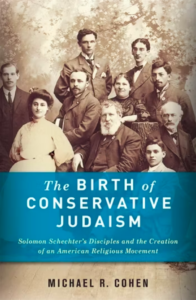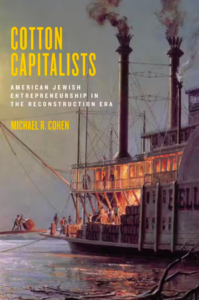Participation Level: Grant Center Library Resource
CULTURE & HERITAGE SERIES – The Jewish Deli: Lecture by Ted Merwin – Author of Pastrami on Rye
For much of the 20th century, the corner Jewish deli was an iconic institution in both Jewish and American life—a kind of homeland for the soul, with pickles on the side. As a social space it rivaled the synagogue as the primary gathering place for the Jewish community. At the same time the deli became an icon in popular culture, featured in a plethora of plays, films, TV shows, songs and stand-up routines.
Beinner Annual Symposium
Contextualizing Antisemitism in Today’s American Jewish Landscape (2025) The Annual Beinner Symposium unites leading scholars and practitioners from diverse fields—including history, literature, economics, sociology, journalism,
A Cross-Continental Conversation: Dr. Ilana Horwitz and Dr. David Slucki Discuss Jewish Socioeconomic Diversity
The conversation touches on the role of Jewish institutions in providing social capital and how changes in religious engagement in the U.S. affect these dynamics.
Kosher Soul: Black Jewish Identity Cooking with Michael W. Twitty
Michael W. Twitty is an award-winning culinary historian and food writer. His 2017 book, “The Cooking Gene,” traced his ancestry through food from Africa to
Antisemitism Uncovered
Presented by the Tulane University Department of Jewish Studies and the Stuart and Suzanne Grant Center for the American Jewish Experience Featuring Dr. Golan Moskowitz,
Wild Visionary: A Book Launch and Conversation on Maurice Sendak
The Stuart and Suzanne Grant Center for the American Jewish Experience at Tulane University hosted this discussion on Maurice Sendak in celebration of the book
Black [but/AND/or] Jewish: A Conversation on Intersections within and across Communities
Co-sponsored by the Grant Center for the American Jewish Experience and the Africana Studies Program at Tulane University. Dr. Mia L. Bagneris, Associate Professor of
What Do We Know About American Jewry?
A Conversation on the 2020 Pew Survey of Jewish Americans Presented by the Stuart and Suzanne Grant Center for the American Jewish Experience at Tulane

Wild Visionary, Maurice Sendak in Queer Jewish Context
Wild Visionary reconsiders Maurice Sendak’s life and work in the context of his experience as a Jewish gay man. Maurice (Moishe) Bernard Sendak (1928–2012) was a fierce, romantic, and shockingly funny truth seeker who intervened in modern literature and culture. Raising the stakes of children’s books, Sendak painted childhood with the dark realism and wild imagination of his own sensitive “inner child,” drawing on the queer and Yiddish sensibilities that shaped his singular voice.

God Grades & Graduation, Religion’s Surprising Impact on Academic Success
Identifies a new type of childrearing logic that cuts across social class groups: religious restraint
Draws on 10 years of surveys with 3,290 teenagers, along with 220 in-depth interviews with American teenagers across the class and racial spectrum
Explains how the different combinations of religious restraint, class, and gender shape the academic trajectory of teens from high school to college
Includes a unique chapter on academically successful atheist students

The Birth of Conservative Judaism, Solomon Schechter’s Disciples and the Creation of an American Religious Movement
Solomon Schechter (1847–1915), the charismatic leader of New York’s Jewish Theological Seminary (JTS), came to America in 1902 intent on revitalizing traditional Judaism. While he advocated a return to traditional practices, Schechter articulated no clear position on divisive issues, instead preferring to focus on similarities that could unite American Jewry under a broad message. Michael R. Cohen demonstrates how Schechter, unable to implement his vision on his own, turned to his disciples, rabbinical students and alumni of JTS, to shape his movement. By midcentury, Conservative Judaism had become the largest American Jewish grouping in the United States, guided by Schechter’s disciples and their continuing efforts to embrace diversity while eschewing divisive debates.

Cotton Capitalists, American Jewish Entrepreneurship in the Reconstruction Era
In the nineteenth century, Jewish merchants created a thriving niche economy in the United States’ most important industry—cotton—positioning themselves at the forefront of expansion during the Reconstruction Era. Jewish success in the cotton industry was transformative for both Jewish communities and their development, and for the broader economic restructuring of the South. Cotton Capitalists analyzes this niche economy and reveals its origins. Michael R. Cohen argues that Jewish merchants’ status as a minority fueled their success by fostering ethnic networks of trust. Trust in the nineteenth century was the cornerstone of economic transactions, and this trust was largely fostered by ethnicity. Much as money flowed along ethnic lines between Anglo-American banks, Jewish merchants in the Gulf South used their own ethnic ties with other Jewish-owned firms in New York, as well as Jewish investors across the globe, to capitalize their businesses. They relied on these family connections to direct Northern credit and goods to the war-torn South, avoiding the constraints of the anti-Jewish prejudices which had previously denied them access to credit, allowing them to survive economic downturns.
